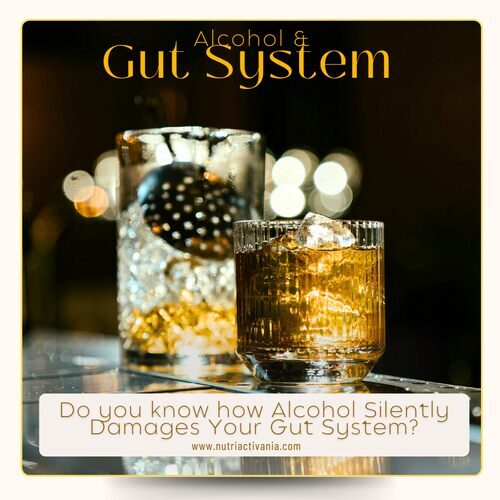Hard drinks like whiskey, vodka, rum, and other high-alcohol beverages may be popular for unwinding or celebrating, but they have hidden effects on our gut health that can be quite damaging. While occasional, moderate drinking might seem harmless, regular or excessive consumption of hard drinks can disrupt the delicate balance within our digestive system, leading to various health issues over time says Avni Kaul, who is one of the best dieticians and nutritionists for gastrointestinal and liver health in India.

How does liquor silently damage your gut system?
Here’s a closer look at how hard drinks affect your gut and why it’s important to consider their impact as explained by dietician Avni Kaul.
Disrupting the Gut Microbiome
The gut microbiome consists of a complex community of bacteria, fungi, and other microorganisms that play a critical role in digestion, immune function, and even mental health. Hard drinks, especially in excess, disrupt this balance by killing off beneficial bacteria.
When harmful bacteria outnumber the good ones, it can lead to dysbiosis, a condition associated with digestive disorders like bloating, irritable bowel syndrome (IBS), and leaky gut syndrome. Dysbiosis has also been linked to weakened immunity, as a healthy gut microbiome supports immune function.
Increasing Stomach Acid Production
Hard drinks can irritate the lining of the stomach and lead to an increase in stomach acid production. While stomach acid is essential for breaking down food, too much can cause discomfort, such as acid reflux or heartburn.
Over time, the excessive acid can damage the stomach lining, leading to gastritis, ulcers, and inflammation. These conditions can cause symptoms like nausea, pain, and even vomiting, which, if left untreated, may worsen and lead to chronic digestive problems.
Weakening the Gut Lining
The protective lining of the gut acts as a barrier to prevent toxins, bacteria, and undigested food from entering the bloodstream. Alcohol, particularly from hard drinks, can weaken this barrier, creating gaps in the gut lining, commonly referred to as “leaky gut.”
A leaky gut allows unwanted particles to escape into the bloodstream, triggering inflammation and immune responses throughout the body. This can result in symptoms such as bloating, fatigue, food sensitivities, and, in some cases, autoimmune issues over time.
Slowing Down Digestive Processes
Hard drinks can slow down normal digestive processes by reducing muscle contractions in the intestines, which helps move food through the digestive system. This slowing down can cause constipation or diarrhoea, depending on how much alcohol is consumed and an individual’s response.
Moreover, alcohol affects the absorption of essential nutrients, leading to potential deficiencies in vitamins like B12, folate, and thiamine, which are critical for energy and cell health.
Altering Hormone Levels in the Gut
Alcohol consumption affects hormone regulation, including those in the gut, such as ghrelin and leptin, which help control hunger and satiety. Hard drinks can increase ghrelin levels, leading to a heightened appetite and possibly weight gain. It can also disrupt insulin levels, which can contribute to blood sugar imbalances and increase the risk of conditions like diabetes and metabolic syndrome.
While hard drinks are often part of social gatherings, their impact on gut health is something to consider seriously. Regular or excessive consumption can disrupt gut balance, weaken the gut lining, and affect the digestive process in ways that may lead to long-term health issues. Reducing intake and focusing on moderation can help protect your gut health and ensure that your digestive system remains balanced and functional.




